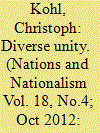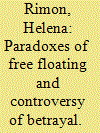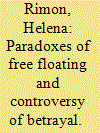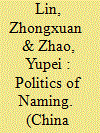|
|
|
Sort Order |
|
|
|
Items / Page
|
|
|
|
|
|
|
| Srl | Item |
| 1 |
ID:
115228


|
|
|
|
|
| Publication |
2012.
|
| Summary/Abstract |
The paper explores how creole categories of people who have constituted a small but influential minority in Guinea-Bissau for centuries contributed to a countrywide, integrated national culture since the eve of independence in 1974. Since independence, several cultural representations previously exclusive to creole communities have been - driven by the nationalist independence movement and the early postcolonial state - transformed into representations of a new national culture, crossing ethnic and religious boundaries. The fact that creole identity and culture had been transethnic - i.e. creole identity brings together individuals of heterogeneous cultural, ethnic and geographic descent - during the colonial period, has fostered in postcolonial times the countrywide spread of previously exclusively creole cultural features. I argue that this 'transethnicisation' of creole cultural representations has unified Bissau-Guineans across ethnic lines, causing a strong commitment with their nation 'from below'.
|
|
|
|
|
|
|
|
|
|
|
|
|
|
|
|
| 2 |
ID:
127853


|
|
|
|
|
| Publication |
2014.
|
| Summary/Abstract |
The present article contributes to the ongoing academic debate on migrants' appropriation of artistic and political spaces in Germany. Cologne, one of the largest cities in Germany, is an interesting example of the tension between political discourse centred around multiculturalism and cultural segregation processes. The 'no fool is illegal' carnival organised by asylum seekers shows their capacity to act, as they reinvent an old local tradition by reinterpreting medieval rituals. Today, different groups and associations appropriate this festive art space: migrants, gays and lesbians, feminists and far-left groups either organise their own parties or take part in the official parties and parades as separate groups. As a result, the celebration of diversity figures on the local political agenda and becomes part of the official carnival festivities. This leads to a blurring of boundaries, whereby mainstream popular culture becomes more and more influenced by multicultural elements.
|
|
|
|
|
|
|
|
|
|
|
|
|
|
|
|
| 3 |
ID:
123054


|
|
|
|
|
| Publication |
2013.
|
| Summary/Abstract |
Throughout the 1900s, intellectuals have been defined as a "privileged minority" (according to Chomsky), or as outsiders, whose "free floating" condition (Mannheim) guarantees their functioning as "custodians of values like reason and justice" (Hofstadter). Julien Benda accused intellectuals of betraying this mission. But, perhaps, betrayal is built into the very nature of their privileged position; perhaps, by pretending to be "free floating," generations of intellectuals have actually been constructing predictable paradigms, using calamity as a new kind of raw material for the old myth of lucrimax (Etkind). The tragic experience of Russian intellectuals provides us with fresh insight for this discussion.
|
|
|
|
|
|
|
|
|
|
|
|
|
|
|
|
| 4 |
ID:
124914


|
|
|
|
|
| Publication |
2013.
|
| Summary/Abstract |
Throughout the 1900s, intellectuals have been defined as a "privileged minority" (according to Chomsky), or as outsiders, whose "free floating" condition (Mannheim) guarantees their functioning as "custodians of values like reason and justice" (Hofstadter). Julien Benda accused intellectuals of betraying this mission. But, perhaps, betrayal is built into the very nature of their privileged position; perhaps, by pretending to be "free floating," generations of intellectuals have actually been constructing predictable paradigms, using calamity as a new kind of raw material for the old myth of lucrimax (Etkind). The tragic experience of Russian intellectuals provides us with fresh insight for this discussion.
|
|
|
|
|
|
|
|
|
|
|
|
|
|
|
|
| 5 |
ID:
190188


|
|
|
|
|
| Summary/Abstract |
This article focuses on the carnival aspects of Chinese Internet culture, but it goes further by suggesting that the productiveness of the online carnival leads to the politics of naming in China’s specific context. This article illustrates the questions of how Chinese Internet users name themselves diaosi (“losers”) to separate and distance themselves from the governing power, how they identify the Zhao (“elites”) to form an internal antagonistic frontier in the “us vs. them” context, and how the diaosi are “floating” and appropriated as xiaofenhong (“little pinkos”) to identify the external enemy rather than the rulers inside. This kind of online carnival is not merely a cultural issue, but is also a political and governing theme that has its roots and routes in contemporary China’s governing rationality.
|
|
|
|
|
|
|
|
|
|
|
|
|
|
|
|
|
|
|
|
|